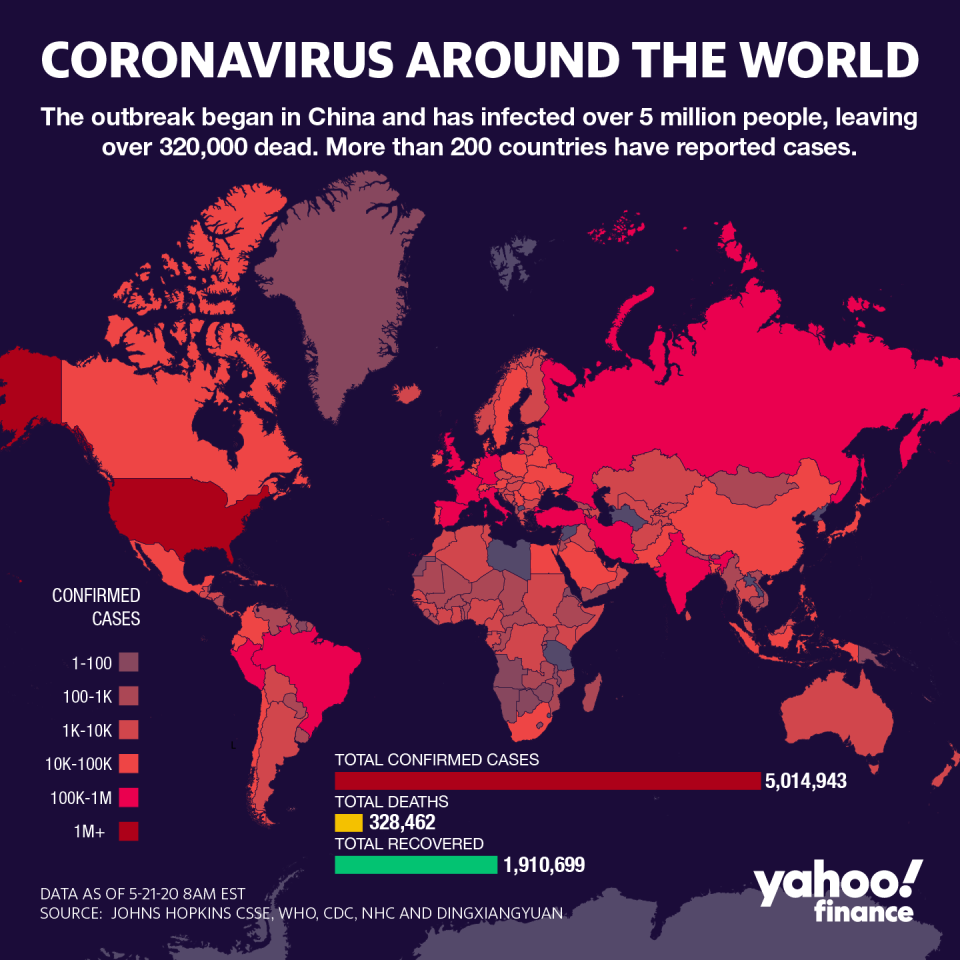The race for a coronavirus treatment is fanning fears of 'vaccine nationalism'
Mounting geopolitical tensions in the wake of the coronavirus pandemic have sparked concerns about the rising threat of “vaccine nationalism,” which may hamper international efforts to cooperate on deploying an effective treatment.
With experimental vaccine trials rapidly progressing in countries that include China, the U.S., Canada and the U.K., expectations are growing that a COVID-19 cure can be made available as early as 2021 — if not sooner for emergency use. AstraZeneca (AZN), Moderna (MRNA), Johnson & Johnson (JNJ), Sanofi (SNY) and Pfizer (PFE) are among those spearheading the more than 100 efforts to field a vaccine candidate.
In recent days, China has vowed to deploy a potential vaccine as a “global public good” that would be accessible and affordable. Toward that end, the World Health Organization also laid out principles to encourage collaboration and information sharing on a COVID-19 treatment.
Yet there are both political and practical considerations surrounding vaccine development, including where a successful treatment will be made, and how quickly the process could be scaled to dose billions of people worldwide. Save to mention the fact that it usually takes years for a candidate to come to market in the first place.
Noting that experimental vaccines have “a very high failure rate,” Scott Rosenstein, a global health special advisor at the Eurasia Group, pointed out in a research note that “before 2020, no vaccine has been created in less than four years and most take at least a decade before they are widely available.”

Although technological advances may ensure a safe and effective treatment by year’s end, Rosenstein wrote that “a battle for vaccine access will ensue, stretching well into 2021 and possibly 2022.”
Any questions about timeline and public interest may take a backseat to growing tensions between the world’s two largest economies, which were already sparring over trade before the COVID-19 pathogen emerged in China.
“Countries rich and poor will engage in aggressive procurement efforts with significant political, economic and public health implications,” according to Rosenstein. “And existing international institutions and agreements will struggle to minimize this ‘vaccine nationalism.’”
To be certain, developing a potential coronavirus vaccine is very costly, but represents a potentially lucrative market. It raises the stakes for whichever company ultimately develops an effective COVID-19 treatment, and its country of origin.
Analysts at Morgan Stanley this week estimated that the “pandemic market” was worth anywhere between $10 billion and $30 billion, even with relatively modest pricing per treatment that could fall anywhere between $5 and $20 a dose.
“Importantly, while companies such as J&J have committed to selling their vaccine at cost (at least for the pandemic period), we believe cost may include recovery of R&D expenses, capex and manufacturing fees,” Morgan Stanley analysts wrote.

While a lack of international consensus isn’t unique to the current COVID-19 crisis, skirmishes over medical equipment and global supply chain bottlenecks have complicated the current dynamic.
“Rich countries have monopolized supplies and equipment, including face masks and medicines used for treating patients in intensive care units (e.g. antibiotics, sedatives), and they are already trying to put in place monopoly agreements with potential manufacturers of COVID-19 vaccines,” the Brookings Institution pointed out in a recent analysis.
Eurasia’s Rosenstein pointed out that multilateralism “will likely not be sufficient to offset overwhelming vaccine demand. Even without a vaccine fight, global coordination has been in short supply in recent months.”
That includes brinksmanship between the U.S. and the WHO, and China’s own lack of transparency regarding what it knows about COVID-19’s emergence, which has fostered more bilateral mistrust.
Meanwhile, nationalist themes are already dominating the domestic narrative. The Trump administration has engaged in efforts to make its supply chains less reliant on other countries. Toward that effort, the U.S. is funding a $354 million contract with a drug startup to manufacture critical medical ingredients domestically.
“This is an historic turning point in America’s efforts to onshore its pharmaceutical production and supply chains,” Peter Navarro, the White House trade adviser, told The New York Times in an interview. The project “will not only help bring our essential medicines home but actually do so in a way that is cost competitive with the sweatshops and pollution havens of the world,” he added.
And just a week ago, French pharmaceutical giant Sanofi sparked an uproar after suggesting it would prioritize the U.S. in the event its vaccine trials were successful.
Although the company was forced to retreat from that suggestion, the damage was largely done. That news converged with a separate account — later denied by all parties — about the Trump administration reportedly offering “large sums of money” for exclusive access to a vaccine under development by German-based CureVac.
To make it clear again on coronavirus: CureVac has not received from the US government or related entities an offer before, during and since the Task Force meeting in the White House on March 2. CureVac rejects all allegations from press.
— CureVac (@CureVacAG) March 16, 2020
All of which brings the debate full circle back to a development timetable that many consider too optimistic. Despite the heat and light from pharmaceutical companies trying to be the first to save the world, it's far from clear whether a vaccine will emerge within the next year, given all the hurdles.
“While there is cautious optimism around the creation of one or more vaccines, the costs and complexity of the next steps – manufacturing hundreds of millions or even billions of doses followed by unprecedented distribution and inoculation efforts – are high,” Rosenstein said.
Javier David is an editor for Yahoo Finance. Follow him on Twitter: @TeflonGeek
Follow Yahoo Finance on Twitter, Facebook, Instagram, Flipboard, LinkedIn, and reddit.
Find live stock market quotes and the latest business and finance news

 Yahoo Finance
Yahoo Finance 
